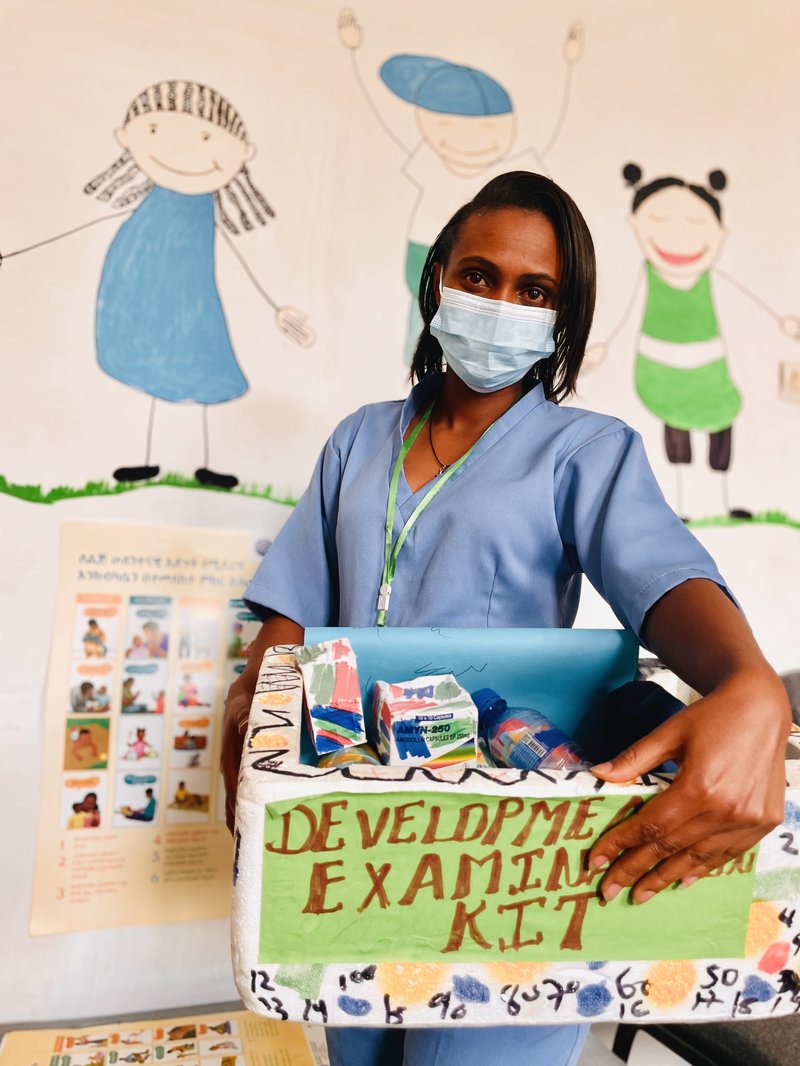Emebat Kemal, a 29-year-old mother of three, was initially unsure about the early childhood development messages she received. Provided during a regular antenatal checkup at the Teklehaimanot Health Center in Addis Ababa, these messages informed her that her unborn baby could hear voices and that playing songs and talking to it could aid in its brain development.
This was the first time she had received such advice during an antenatal consultation. Despite her initial doubts, the health center staff continued to counsel and encourage her to adopt these practices. Intrigued, Emebat decided to play music on her phone and place it on the left side of her abdomen to observe how her unborn baby would respond. To her astonishment, the baby reacted with kicks and movement.
Emebat couldn’t contain her excitement as she eagerly shared her experience with her husband when he arrived home that evening. She told him about how the fetus responded to the songs she played, and she invited him to observe it for himself. Much to his surprise and delight, he witnessed their baby kicking and moving inside her womb. This special moment inspired him to engage further by gently massaging Emebet’s belly and talking to the growing baby in the womb.
Emebat revealed that her husband had initially expressed dissatisfaction with the frequent visits from health extension workers to their home, who have also started sharing early childhood development messages of late.
Health extension workers are an integral component of Ethiopia’s community health strategy, where they conduct a range of health promotion and sensitization activities. Emebat’s husband would often question their presence and voice his frustration, stating, “Why do these people come to our house so often? I don’t want to see them here,” Emebat recalls. However, witnessing the positive impact of the support they provided on Emebat and their baby, he had a change of heart.
Guidance backed by research
Decades of research have shown that children’s early experiences in life have lasting effects on their health, education, and success in adulthood. The first three years of a child’s life are a crucial period for brain development, making it essential to provide children with nurturing care during this time.
Nurturing care is defined as good health, adequate nutrition, responsive caregiving, and opportunities for early learning—all provided within the context of a safe, secure environment. The health sector is the primary sector that consistently reaches caregivers and children during this critical window of opportunity, which is why the World Health Organization’s Nurturing Care Framework (2018) recommends that routine health services expand their scope beyond survival to counsel caregivers on age-appropriate responsive communication and early learning and monitor for developmental delays.
In addition, it is equally important to invest in promoting maternal mental well-being, as maternal depression and poor mental health can negatively impact children’s growth and development.
Nurturing care is defined as good health, adequate nutrition, responsive caregiving, and opportunities for early learning—all provided within the context of a safe, secure environment.
Funded by the Bainum Family Foundation, PATH has supported the Ethiopian government’s Yenege Tesfa (“Happy Child”) initiative to ensure that young children and their caregivers in Addis Ababa receive more comprehensive nurturing care as part of routine health services delivered in health facilities such as Teklehaimanot Health Center, where Emebat receives care. This has taken the form of integration of developmental monitoring and counseling into universal maternal and child health services such as antenatal care, childbirth, postnatal care, growth monitoring and care, and care of sick children, as well as play sessions in health facility waiting areas.
In addition to Ethiopia, PATH is currently supporting governments to provide these services in Kenya and Mozambique. In the past, it has provided support in countries as diverse as Côte d'Ivoire, South Africa, Turkey, and Zambia.
In Addis Ababa, through a collaborative effort between PATH and Yenege Tesfa, nearly 3,000 health service providers, including health extension workers, in all 101 public health centers have been trained on how to integrate child development supportive interventions into routine health services. Furthermore, during play sessions, caregivers learn and practice playing and communicating with children using age-appropriate play materials built from locally sourced materials.

Nurse Myriamawit Sijlibalo holds a box of locally made play materials at the Teklehaimanot Health Center immunization clinic in Addis Ababa's Lideta sub-city. Photo: PATH/Charles Wanga.
Community health extension workers also provide parental coaching during home visits and at the community level and promote nurturing care practices at the household. In just two years, over 1 million consultations involving children under five years of age have integrated developmental monitoring and counseling into health services in Addis Ababa.
Three months later, Emebat gave birth to a baby girl they named Milka. Diligently applying the nurturing care practices, she had learned, Emebat continues to bond with Milka through music, gentle massages, and interactive communication. Milka is blossoming into a vibrant, curious, and healthy child. Emebat's unwavering commitment to providing nurturing care has brought immense joy and fulfillment to their family, paving the way for a bright and promising future for little Milka.



